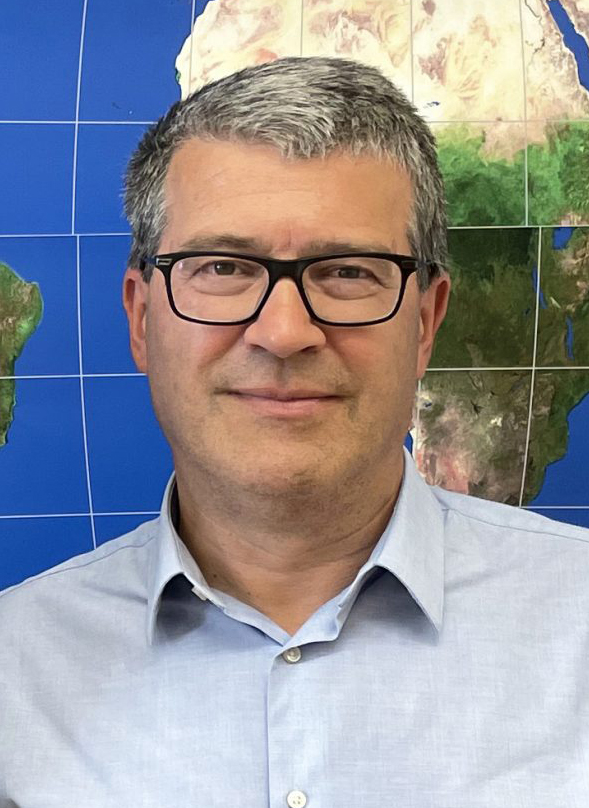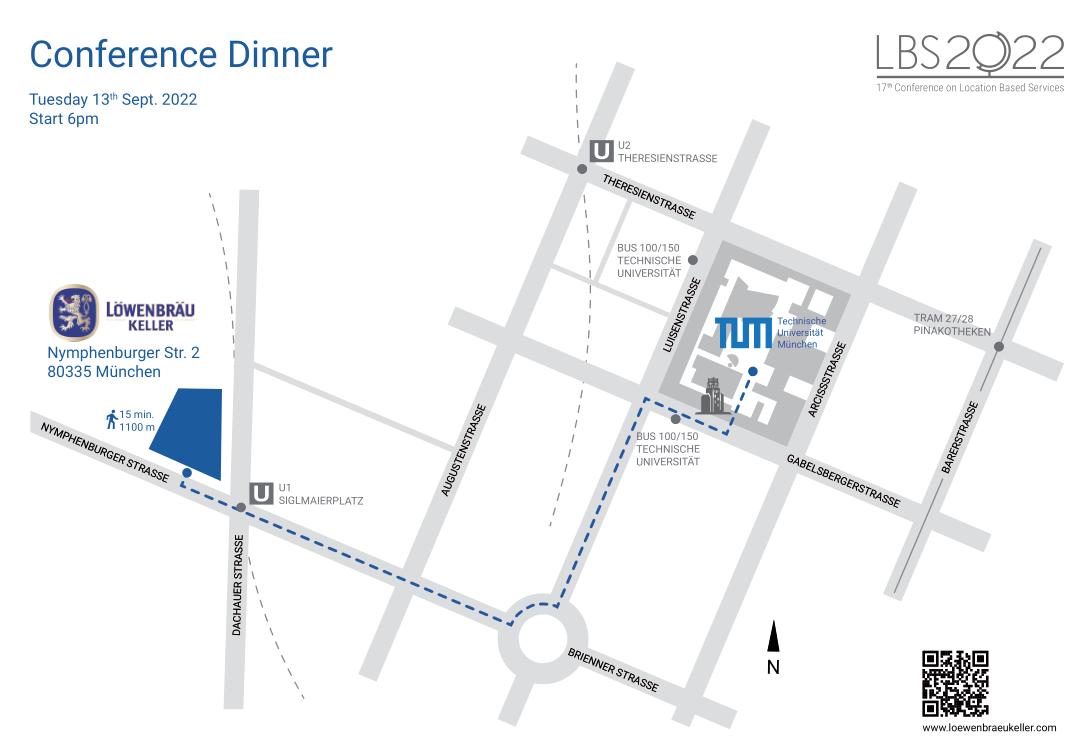Program
Presentations
Influence of tracking duration on the privacy of individual mobility graphs
1Institute of Cartography and Geoinformation, ETHZ, Switzerland; 2Institute for Advanced Research in Artificial Intelligence (IARAI); 3Equal contribution;
Exploration of User Privacy in 802.11 Probe Requests with MAC Address Randomization Using Temporal Pattern Analysis
1Universitat Jaume I, Spain; 2Brno University of Technology; 3University of Minho;
An exploratory analysis on using social media to monitor environmental issues and natural disasters
1CartoGIS, Ghent University, Belgium; 2IDLab - Imec, Ghent University, Belgium;
Exploratory analysis of mobile app usage in relation to distance from home
University of Zurich, Switzerland;
Towards a GeoSocial Landmark Identification Model
University Augsburg, Germany;
Replication of Wayfinding Studies in Different Geographic Areas. A Simulation Study
TU WIEN, Austria;
Neuro-adaptive LBS: A research agenda on human- and context-adaptive mobile maps for pedestrian navigation and spatial learning
University of Zurich, Switzerland;
Analytics of human migration patterns: use cases of Amsterdam and Copenhagen
Aalborg University, Denmark;
A Mobile Mapping Solution for VRU Infrastructure Monitoring via Low-Cost LiDAR-Sensors
Technical University of Munich, Germany;
Acquisition of Spatial Knowledge with Augmented Reality Display on Windshield in Autonomous Vehicles
University at Albany, State University of New York;
An Analysis of the Properties and the Performance of WiFi RTT for Indoor Positioning in Non-line-of-sight Environments
1University of Brighton, United Kingdom; 2Royal Holloway University of London, United Kingdom;
The impact of COVID-19 on daily lives of transnational people based on smartphone data: Estonians in Finland
1University of Helsinki, Finland; 2University of Helsinki, Finland; 3University of Tartu, Estonia; 4University of Tartu, Estonia;
Generating indoor route instructions with multiple levels of detail
1University of Zurich; 2Umeå University; 3The University of Melbourne; 4Ghent University;
An Emerging Conceptual Model for Curating Engaging Leisure Walking Recommendations
1Nottingham Geospatial Institute, University of Nottingham, Nottingham, United Kingdom; 2Mixed Reality Lab, University of Nottingham, Nottingham, United Kingdom; 3School of Geography, University of Nottingham, Nottingham, United Kingdom; 4Ordnance Survey; 5Department of Digital Humanities, King’s College London, London, United Kingdom;
Reproducible methods for spatio-temporal accessibility and mobility studies
1Department of Built Environment, Aalto University, Finland; 2Department of Geosciences and Geography, University of Helsinki, Finland;
Improving Indoor Navigation with Temporal data
1Chair of Cartography and Visual Analytics, Technical University of Munich; 2Chair of Photogrammetry and Remote Sensing, Technical University of Munich;
Implementation of an Indoor Positioning System (IPS) on a university campus
University of Applied Sciences Würzburg-Schweinfurt, Germany;
DP Mobility Report: A Python Package for Mobility Data Explorations with Differential Privacy Guarantees
1Hochschule für Technik und Wirtschaft Berlin, University of Applied Sciences, Germany; 2Technische Universität Berlin;
A pilot service for sharing obfuscated personal level location data
NLS Finland, Finland;
Social Implications in AI Ethics Issues
TU-München;
An effective and efficient neural network for fine-grained citywide crowd information prediction
Ghent University, BL;
Trip and transportation mode detection using smartphone application tracking data
University of Tartu, Estonia;
Method Development for the Visualisation of Bicycle Trajectories and Traffic Related Parameters by a Space-Time Cube
Technical University of Munich, Germany;
CartoWalk- app development
TU Wien, Austria;
Improving spatial memory with mixed reality-based grid visualization
Technical University of Munich, Germany;
Building Virtual Knowledge Graphs from CityGML Data
1NTNU Norway, Norway; 2Bergen University, Norway; 3Free University of Bozen-Bolzano, Italy; 4Umeå University, Sweden; 5Technical University of Munich, Germany;
Lifting geographic relevance to the next generation location-based services in a digitally transformed world
University of Zurich, Switzerland;
Self-Localization of Instrumented Probe Bicycles
Salzburg Research Forschungsgesellschaft mbH, Austria;
Understanding the Uncertainty in Measuring Close Contacts Using Mobile Phone Location Data
University of Wisconsin-Madison, United States of America;
Location monitoring of probationers with a smartphone application
University of Tartu, Estonia;
Optimization for large scale logistics using the hybrid sparrow search algorithm
1Technical University of Munich, Germany; 2China University of Geosciences;
Attractivity context graph for exploring the travel activity of Flickr users
The Technion, Israel;
Integrating real-time data into a campus information system with senseBox and GeoEventServer
University of Applied Sciences Würzburg-Schweinfurt, Germany;
How can voting mechanisms improve the robustness of individual toponym resolution approaches?
1German Aerospace Center, Germany; 2University of Lincoln, United Kingdom;
Predicting the transport pathway of dust storms using convolutional neural network
1K. N. Toosi University of Technology, Iran, Islamic Republic of; 2University of Hormozgan, Iran, Islamic Republic of;
Accuracy Enhancement of Cadastral Boundary Marker Coordinates with Smartphone Crowdsourcing
Finnish Geospatial Research Institute (FGI, NLS);
An analysis of potential spaces for implementing geofences in a dynamic bike-sharing system
1University of Augsburg, Germany; 2Chair of Traffic Engineering and Control, Technical University of Munich; 3Applied Geoinformatics, Institute of Geography, University of Augsburg;
1Key Laboratory of Virtual Geographic Environment (Nanjing Normal University), Ministry of Education, Nanjing 210023, China; 2Jiangsu Center for Collaborative Innovation in Geographical Infor-mation Resource Development and Application, Nanjing 210023, China; 3School of Geography, Nanjing Normal University, Nanjing 210023, China;
1Key Laboratory of Virtual Geographic Environment (Nanjing Normal University), Ministry of Education, Nanjing 210023, China; 2Jiangsu Center for Collaborative Innovation in Geographical Infor-mation Resource Development and Application, Nanjing 210023, China; 3School of Geography, Nanjing Normal University, Nanjing 210023, China; 4Sanjiang University, Nanjing 210012, China;
Keynote Speaker
 Georg Gartner is Professor for Cartography and Geo-Mediatechniques at the Research Group of Cartography at the Vienna University of Technology, Vienna, Austria
Georg Gartner is Professor for Cartography and Geo-Mediatechniques at the Research Group of Cartography at the Vienna University of Technology, Vienna, Austriahttps://cartography.tuwien.ac.at/georg-gartner/
Keynote title: Location-based Services Revisited
Abstract: Location-based Services have developed as a rapid answer to the mobile information era. Research, technologies and developments have been pursued to allow in breathtaking short time applications of mobile services,navigation systems and all kind of diverse applications, from outdoor to indoor and mixed outdoor/indoor environments, from location based to context-aware, from maps and audio to more diverse and ‘natural’ interfaces, from technology-oriented to interdisciplinary applications. In the meantime, LBS is a ubiquitous underpinning technology of daily mass use applications. So, what is left and where to now? Some aspects of concerns and possible directions will be discussed.
 Harvey J. Miller is Professor at the Department of Geography at the Ohio State University, Columbus, USA
Harvey J. Miller is Professor at the Department of Geography at the Ohio State University, Columbus, USAhttps://geography.osu.edu/people/miller.81
Keynote title: Why is sustainable mobility so hard? Some observations on the paths forward.
Abstract: Mobility is central to urbanity, and urbanity is central to our common future as the world's population crowds into urban areas. This is creating a global mobility crisis due to the unsustainability of our 20th century transportation systems for a crowded and connected world. We need to move beyond inflexible, unsustainable and brittle car-dominated mobility monocultures to flexible, sustainable and resilient mobility polycultures with a wide spectrum of integrated mobility options. This transition is hard because mobility is complex, a wicked problem and a fundamental social dilemma. In this talk, I will discuss how we can leverage the urban data revolution to resolve these challenges. In particular, I will discuss the role of next generation urban observatory science that respects complexity, embraces uncertainty and conflicting values, facilitates urban experimentation and creates environments for collaboration and knowledge co-production. I will identify the major scientific challenges, merits and broader impacts of the observatory approach to transportation and urban science.
